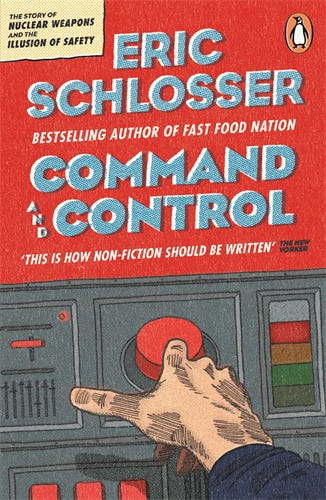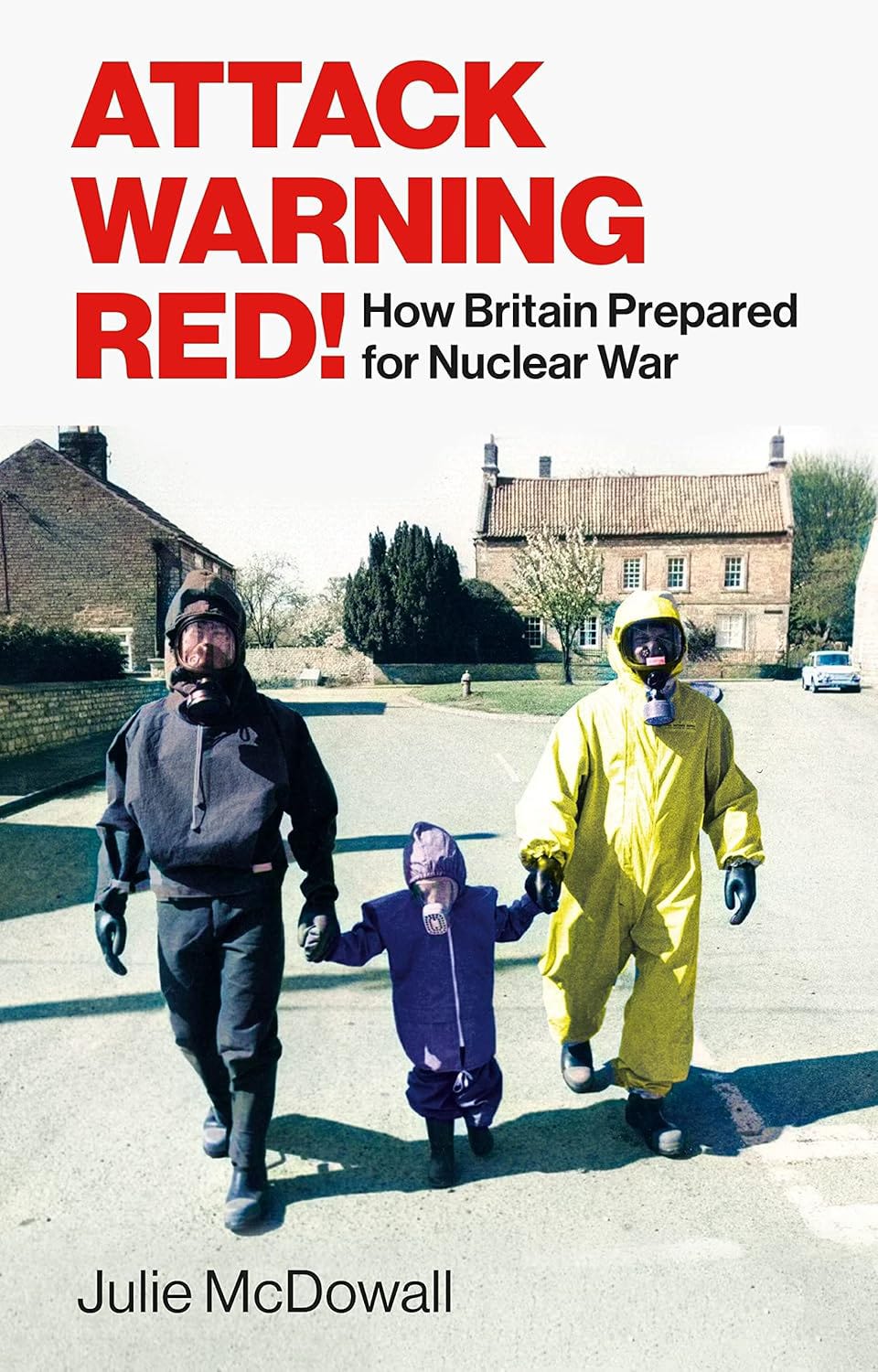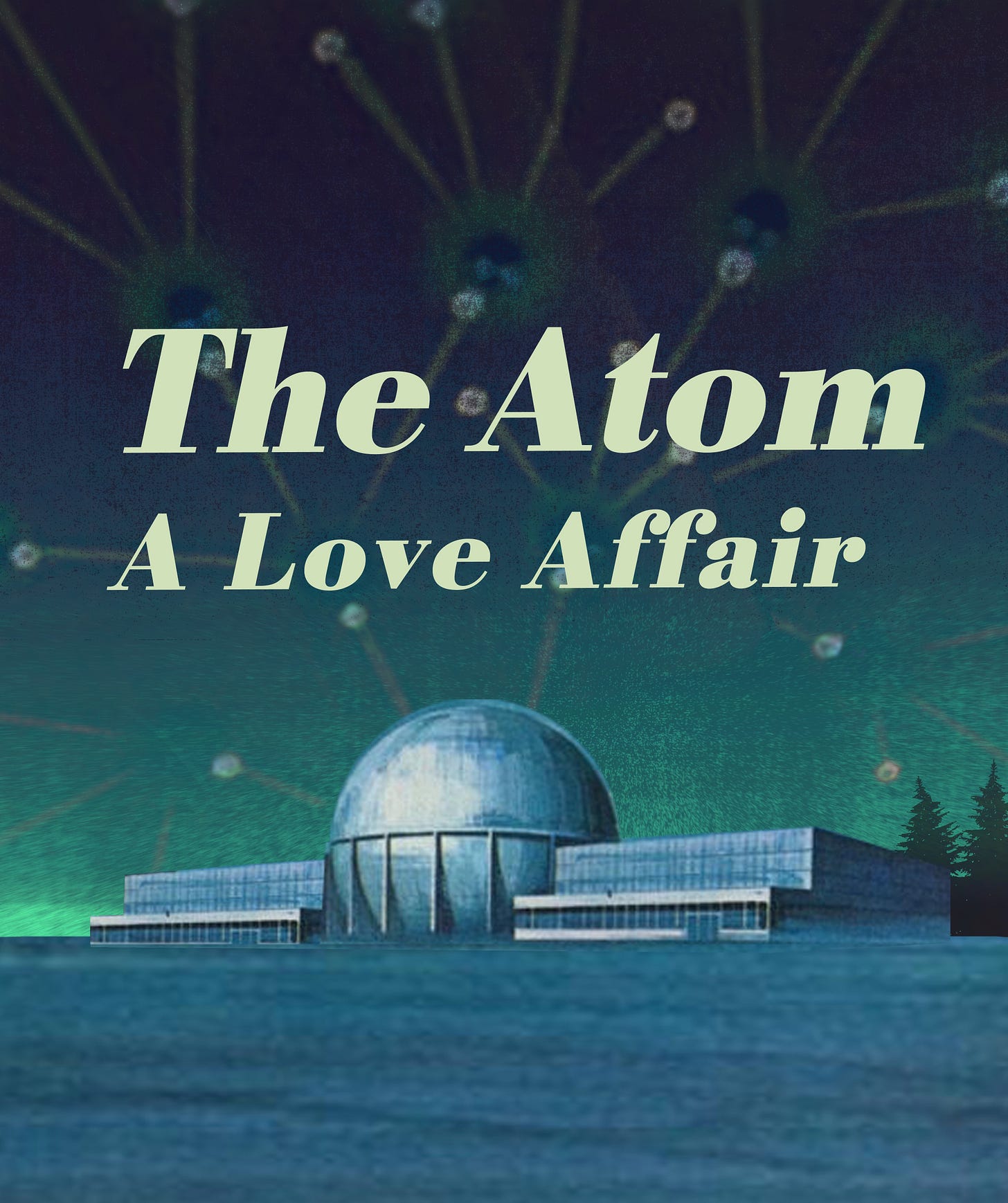'Threads' bonus post
More to read, watch & listen to if you want to go deeper into the research and human stories around the scariest of scary nuclear weapons dramas
Hi friends. And if you’re reading on the day this is posted, then Happy Halloween… and Happy Diwali. An intriguing mix of the dark and the light indeed (and a relatively unusual coinciding of the two, which are usually at least a few days apart).
This post is, I’m bound to say, very much on the dark side of the street. But it’s reassuring to be reminded that the light is never too far away, eh…
And so on to business. I decided to separate this final resources section of my larger Threads post out on its own, to prevent the original from becoming too unwieldy.
If you missed that first post you can catch up here (and do check out the comments which are well worth your time too – including recollections very kindly shared by
who actually appeared in the film as an extra):When nuclear war came to Sheffield
Thanks for joining me for this deep dive into Threads.If you’re new here, do check out this post for a bit more about me. TLDR: I'm a documentary filmmaker coming to the end of distributing my debut feature doc about the history of nuclear power and currently exploring/expanding into the next steps of my working adventures. If you enjoy my writing, do f…
There's no denying Threads is an incredibly tough watch. So if you don't think your nervous system can take it right now, that's ok. Sometimes a more dispassionate, journalistic approach can be easier to handle - especially emotionally - than the intense human feelings generated by drama.
If you do feel moved to learn more about the impacts of nuclear weapons but don't feel ready for the full embodied gut punch of watching Threads, here are some of the factual programmes made in the same period which either inspired or were inspired by it. And of course, if you've seen Threads but want more context these would be greatly recommended for you as well.
Panorama – If the Bomb Drops (broadcast March 1980)
Presented by a fresh-faced Jeremy Paxman, this was the programme that first publicly revealed the government's farcically insufficient 'Protect & Survive' guidance, produced between 1974 and 1980, on what ordinary people should do in the event of a nuclear attack. The attitude of some of the public officials revealed by this film is disturbing to say the least...
QED – A Guide to Armageddon (broadcast July 1982)
The documentary made by Mick Jackson that directly inspired Threads. The dispassionate tones used to describe the impact of a nuclear blast on the human body are particularly bone-chilling (and their imprint on the narration employed in Threads itself is very apparent too):
On the 8th Day (broadcast Sept 1984, the day after Threads)
This documentary goes deeper into the (then) new theory of nuclear winter, developed by scientists on both sides of the Iron Curtain, many, rather extraordinarily, working on it in their spare time. It reveals devastating potential impacts on the planet from smoke and soot from a nuclear blast, including temperature drops of up to 40ºC.
The Newsnight Nuclear Debate (broadcast Sept 1984, the day after Threads)
A programme that feels like a relic from another age in so many ways.
A panel made up entirely of middle aged, white men in suits; lengthy discussion of complicated ideas amongst contributors who certainly don't all agree with one another, but express that disagreement with a respectful spirit of intellectual engagement and curiosity, (as compared to the ad hominem point-calling in social media friendly soundbites we get served up today); and above all an entire hour of mainstream terrestrial television devoted to discussing the possibility, likelihood and ramifications - politically, socially and scientifically - of nuclear war.
Protect & Survive – the films
Worth watching if you've never seen them, here's the full collection of films in the aforementioned British public information series, 20 episodes in all - sinister and absurd in equal measure. And once you know, it I guarantee that jingle will forever haunt your nightmares..
As well is these contemporary factual companion pieces, there’s a whole world of other Threads-adjacent content out there to explore if you want to delve even deeper (and this is by no means an exhaustive list).
Radio/Podcasts
On the audio front, BBC Radio 4 recently produced an episode of 'Archive on 4' to mark the 40th anniversary:
And if you want to go really in-depth, Julie McDowall's superb Atomic Hobo podcast, home to a wealth of excellent nuclear weapons-related content, breaks down the film minute-by-minute in an extended series of episodes covering 'Four Minutes of Threads' - here’s the first one:
Books
Books-wise, a new book to mark the 40th anniversary has been published this year by author Bob Milke:
There's also a good interiew with Milke talking about his book on another recommended podcast My Nuclear Life:
And the recently-published third edition in the Scarred for Life book series exploring the darker reaches of pop culture in 70s & 80s Britain apparently has several chapters devoted to Threads:
A great exchange in the comments on my original piece with
inspired me to flag up this book by Eric Schlosser, best known for writing Fast Food Nation, which looks at another extremely scary aspect of the nuclear weapons issue not really touched on in Threads – the possibility of accidental use. Its recounting of a number of alarming nuclear weapons accidents in the United States over several decades will not help you sleep any easier at night.And related but no less terrifying is the risk of a nuclear exchange taking place because of a false alarm or miscommunication. Such false alarms had incredibly happened just the year before Threads was broadcast, not once but twice. This book by esteemed documentary filmmaker and writer Taylor Downing takes us through the events of that year in careful, panic-inducing detail.
Julie McDowall has also published a highly recommended book on Britain's preparations for nuclear armageddon:
Online
As well as humming comments sections on YouTube, Reddit and IMDb, I can't not mention the incredible online community of 'Thread-heads', the Threads Survivors Facebook group, where pushing 2000 members get together to obsess over the film. The group's founder Sean Judge even makes action figures of the famous traffic warden who adorned the cover of the Radio Times the week it was broadcast in 1984.
And finally a few other drama recommendations - should you feel like subjecting yourself to an atomic apocalypse movie marathon...
When The Wind Blows (1986)
As I mentioned in the larger post, Threads was far from alone in tackling nuclear war through the medium of film in the 1980s. Raymond Briggs' animated movie When The Wind Blows (adapted from the graphic novel of the same name) covers much of the same territory as Threads, but at a further remove from the detonation of the bomb, following as it does an elderly couple in rural Sussex, some 50 odd miles from London.
We watch the couple confusedly try to prepare for the coming attack, with muddled recollections of their experience of the Second World War intermingled with ineffective attempts at following the Protect & Survive government advice pamphlet. With its title song famously supplied by David Bowie and a soundtrack with contributions from Roger Waters, Genesis, Squeeze, Hugh Cornwell and Paul Hardcastle, it's heartbreakingly moving in its quiet depiction of total devastation.
The Day After / Testament (both 1983)
There were fictional attempts to render the impacts of nuclear war on the other side of the Atlantic too. In fact, Jackson heard about probably the best known of these, 1983's The Day After, featuring a big-name cast led by Jason Robards and JoBeth Williams, while he was still in pre-production on Threads. Concerned about duplication, he vowed to stop work on his film if the American offering provided an honest rendering of the true likely effects of a nuclear strike. Obviously he felt it didn't, since he did of course go on to complete production on Threads.
His main objection about the made-for-TV movie, which depicts the aftermath of a nuclear strike on US soil on a rural community in Kansas, was its ‘Hollywoodification' - reducing nuclear apocalypse to familiar disaster film tropes:
“At one point, in what should be the hellish confusion of a hospital overrun with maimed survivors – and isn't – the camera 'dramatically' dollies into a close-up of Jason Robards as he delivers a set-piece monologue, describing 'what he saw' and 'what he felt'. I'm not sure if the music swelled or not, though I certainly remember it doing so.”1
Broadcast the same year, another less well know nuclear drama, Testament, this one made by a female director, depicts the slow devastation and death wrought on a suburban Bay Area town after much of the eastern coast of the United States is taken out by a series of nuclear explosions. Though far from the blast impact itself (the film never shows a mushroom cloud or any direct scenes of nuclear violence), destruction still comes to the town in the shape of food and fuel shortages, later followed by radiation sickness, rapid onset dementia, the gradual breakdown of law and order and ultimately civilisational collapse.
Full disclosure: I've not seen either The Day After or Testament, though I certainly plan to. If you have watched/do watch them, I'd love to know what you make of them. Here are both trailers:
The War Game (1965)
I can't finish this piece without at least some reference to another British nuclear bomb film, which preceded Threads by 20 years and was a definite influence both on Jackson himself and on the BBC's decision to commission Threads. The War Game, by 29 year old British director Peter Watkins, definitely merits its own full piece (she says, adding to list!) but for now here are the top-lines of what you need to know.
Filmed in early 1965, it is, like Threads, a docudrama depicting the effects of a nuclear bomb being detonated over the UK, in this case, on Kent, south of London – a retaliatory strike by the Soviet Union in response to a US nuclear strike on them. But unlike Threads, despite being commissioned by the BBC, it was, on delivery, deemed “too horrifying for the medium of broadcast” and likely to cause “considerable distress and a defeatist attitude amongst the mass TV-watching public” and wasn't actually broadcast on television, or indeed publicly screened anywhere in the UK, for almost another 20 years.
It did have limited international screenings and actually won the 1967 Oscar for Best Documentary. Subsequent investigations have revealed a disturbing degree of pressure brought to bear on the BBC by the Home Office not to screen the film, something which Jackson, who joined the BBC around that time, says caused a great deal of internal shame at the corporation. That's another story for another day though. Till then, if you can face it, here's a brief extract:
Watch my film on Netflix (in Europe) or Vimeo (everywhere else) - or see trailer, reviews & bonus content HERE
Find me on X /Twitter & at LinkedIn
Life stories website – coming soon...
Quote taken from an emailed exchange between Mick Jackson & journalist George Bass for this BFI article















This is an amazing round up of resources, Vicki. Good on you for collating it all. I'm going to save it for daylight hours, though, to avoid nightmares!
Valuable information here, both from a historical standpoint and an educational one. I'm still working myself up to watching Threads, but the other links are also fascinating.
I remember watching When The Wind Blows, in my impressionable youth too :)